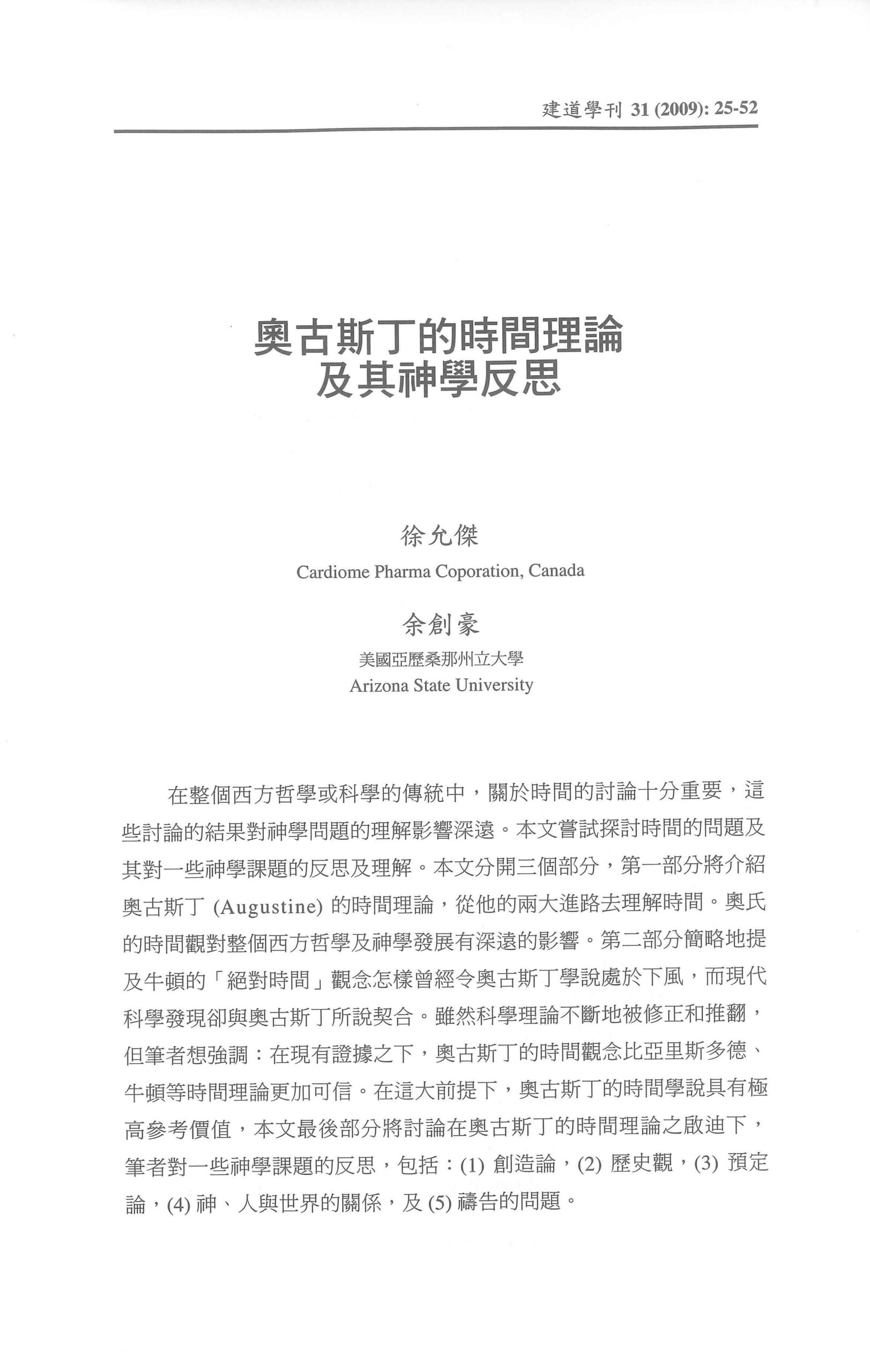奧古斯丁的時間理論及其神學反思/徐允傑、余創豪
撮要
本文討論奧古斯丁的時間理論及其神學反思。(一)本文先從奧氏對理解時間的兩大進路:宇宙論及心理方法,去討論時間的起源;時間與創造及永恆的關係;過去、現在、將來的時間怎能存在;及靈魂與時間的關係。(二)第二部份討論牛頓的「絕對時間」觀念,雖然「絕對時間」曾經令奧古斯丁學說處於下風,但現代科學的發現卻與奧古斯丁所說契合。(三)本文最後探討奧古斯丁的時間觀對哲學及神學引伸出來的含意:(1)創造論:如果跟隨奧古斯丁的進路,六日創造論所造成的「科學與宗教之爭」是庸人自擾。(2)歷史觀:聖經以創世記的創造論開始,以啟示錄的末世論結束,為人類歷史提供了一個圓滿的圖像。這種歷史觀是獨一無二的,與奧古斯丁的時間觀亦息息相關。(3)預定論:神活於永恆現在(ever-present)之中,當我們說神預知未來發生的事情,我們作出這種理解是受限於時間中的思維。(4)神、人與世界的關係:上帝繼續創造,承托着世界。世界在上帝的永恆中存在着,但同時也被時間所限制,時間性(temporality)是人的存有之可能性,倘若沒有時間,人的存在價值變成疑問。(5)禱告的問題:若萬人在同一刻向神祈禱,神是否需要或是否可能再同一剎那間聆聽所有人的祈禱呢?但上帝是活在永恆現在之中,同一時刻或是千萬年前又或千萬年後萬人向神祈禱,對神來說也是在祂的現在發生。
ABSTRACT
In the tradition of philosophy and science, time is a very important concept. The results from the investigation of time have tremendous impact on the reflections of theological issues. This paper attempts to investigate the theory of time and its implications contributing in the understanding of some theological issues. The paper begins with the discussion of Augustine’s theory of time. Augustine’s theory of time can be understood through two different approaches: cosmological and psychological. In the cosmological approach, the questions of the origin of time, the relationship between time and eternity, and the nature of time are discussed. In the psychological approach, time is understood through the discussion of how the 3-folded time structure: past, present and future can exist and its relationship with the soul’s activity and its distention. After presenting about the two approaches in Augustine’s theory of time, the authors discuss how the rise of Newtonian “absolute time” became a challenge to Augustinian conceptualization of time and why the counter-argument by Gottfried Leibniz is considered inadequate. Based upon the conclusion that Augustine had tried hard to develop his theory of time in both objective and subjective level, the authors reflect upon four different theological issues under the light of the implications of Augustine theory of time. The theological reflections involve four issues: (1) Creation; (2) History; (3) Predestination; (4) Relationship among God, man and the world; and (5) The problem of prayer. It is demonstrated that the proper understanding of time will shed light in the understanding of the above theological issues.
原載於《建道學刊》31期(2009年1月),頁25-52。
最新文章
【畢業生分享】重新導航──導引一生的神 / 王雅君
2026 年 1 月 1 日
【畢業生分享】屬靈導引的生命體會——與上主同工的旅程 / 黃芳
2026 年 1 月 1 日
【校本部學生分享】重拾與主同行的節奏——依納爵神操旅程反思 / 鄭家恩
2026 年 1 月 1 日
編輯精選
[電子書]困境與抉擇:「建道研究中心30週年誌慶」跨學科研討會論文集/廖炳堂、倪步曉主編
2025 年 1 月 2 日
從梧州到長洲:建道神學院125年的挑戰與恩典 / 陳智衡
2023 年 10 月 1 日
微小教會的見證/高銘謙
2023 年 6 月 1 日







